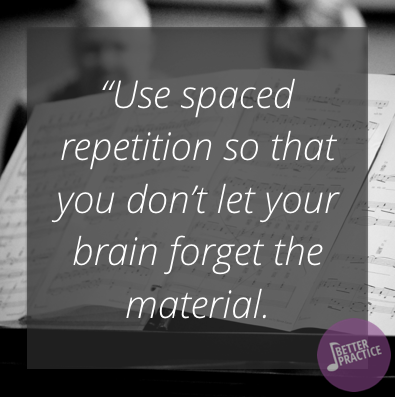Memorizing a piece is great… once it’s memorized. You can play with more emotion and not be tied to checking if you’re playing the right notes. But getting there is the hard part. What are things you need to be doing to memorize a piece effectively and quickly?
Break it down!
1. Use chunking. To memorize a piece, one must first understand how the piece breaks down into smaller chunks. Recognize and mark different sections, and notice where material repeats. Create digestible chunks, and aim to memorize those chunks little by little. Don’t stuff the whole sandwich in your mouth – take bites until the whole thing is done (like a normal person!!).
2. Find patterns. Within those chunks, find patterns. It’s a lot easier if you’re good with recognizing chord movement, what key you’re in, etc. A bunch of notes are a lot harder to memorize than groups of ideas.
Take this example: Memorize the number 235426617. Quick! Well, it’s not efficient to read the number over and over again. We can chunk it – it’s 9 numbers so we can remember those 3 chunks: 235, 426, and 617. We can now also see that the first numbers are 2, 4, 6. Much easier. But wait! What about patterns in the chunks to make it even easier? 2+3=5, 4+2=6, and 6+1=7. Now, you can probably recite the number off the top of your head. You should be doing the same with music, instead of trying to memorize note by note, measure by measure. There’s a method to the madness – composers don’t just write random notes! (Well… some do, but that’s a different story.)
Listen!
You might be able to play the piece through from top to bottom with sheet music, but are you able to sing it all the way through without looking at it? If you’re not 100% clear on the structure of the piece and what comes next, you’re going to have a hard time memorizing. This one’s easy: just find a recording of the piece that you like, listen and sing with it (in the car, while you work out, while you shower, etc.) until it becomes second nature (you know – like when you’ve listened to an album so many times that you can start singing the next song before the current one even ends).
No peeking!
When you’re just starting out on memorizing a piece, it’s okay to simply close your eyes while playing and open them when you need to remember a part. However, as you’re getting close to memorizing the whole thing and you have a couple brain farts – don’t peek immediately! Chances are, you do remember what comes next. Relying on the sheet music for immediate answers doesn’t help your recall, and you’ll probably forget it again. Stop and think for a minute. Where you are in the music? What section? What chunk? Then, double check with the music (or look if you really couldn’t remember) and practice the heck out of that part sans music to lock it in.
Retain it!
1. Sleep! Sleeping is an often overlooked but very important part of memory consolidation. You might be frustrated – you keep practicing the piece and keep forgetting one part. You’ve repeated it, thought about it, chunked it, etc. but you just have a giant brain fart when you get to that section. Chances are you need some sleep. Well, firstly, because practicing when you’re dead-tired, unfocused, and not retaining anything isn’t good for you, but also because your brain actually needs sleep to encode things into its long-term memory. Sleep is like your brain’s filing away and storing time. Even short naps have been proven to help, although the longer the better.
2. Spaced repetition. (Hint hint: this is what Better Practice uses to help you learn assignments more quickly.) Spaced repetition is a proven way to retain things better for a longer period of time. You would use this after you’ve got your piece memorized and ready to perform, to retain it as part of your repertoire. A very condensed explanation of this technique is as follows: you practice in spaced out intervals so that you don’t let your brain forget the material. You forget less and less as time goes on, so your practices can be spaced farther and farther apart. When you practice the piece again right as your brain might be forgetting it again, you boost it back up with a “Hey, remember? This is important!” and your brain further encodes it into your long-term memory. Read more about it here: Hacking Your Brain To Effective Practice.
